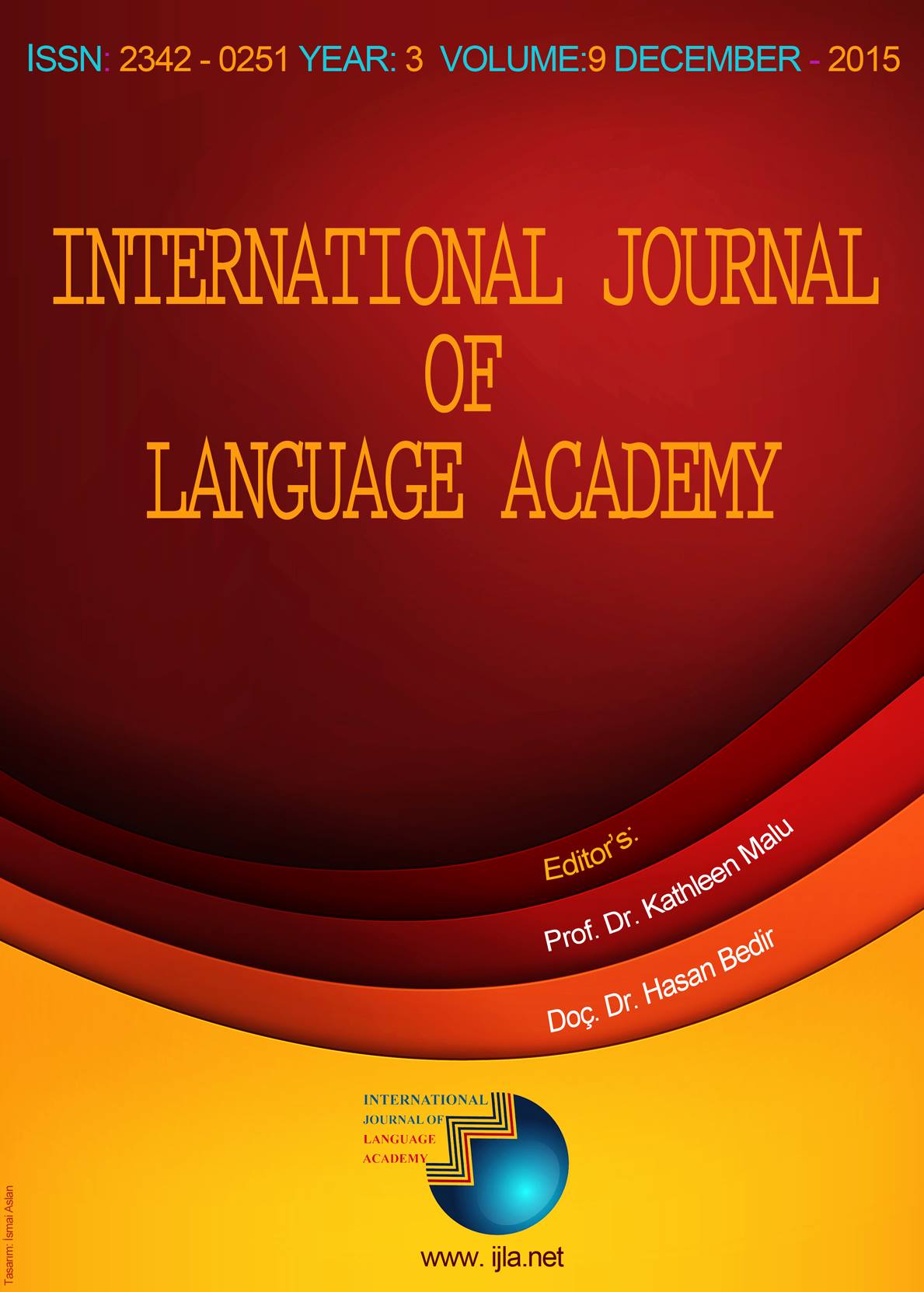Author :
Abstract
Bir ülkenin eğitim politikası, çağın gereklerine uygun bir şekilde belirlenir. Bugün, sınırların giderek ortadan kalktığı, bireylerin öncesine oranla diğer kültürlerle daha sık iç içe yaşamaya başladığı bir dönemdeyiz. Artık bireylerin bağımsız öğrenme, çokdillilik ve çokkültürlülük becerilerinin geliştirilmesi, eğitim kurumunun öncelikli hedefleri arasındadır. Bireylere bu yeterliklerin eğitim yoluyla kazandırılması ile bireylerin küreselleşen ekonomik koşullarla başa çıkılabileceği düşünülmektedir. Politik-toplumsal koşulların belirlediği bu hedeflere ulaşmada Avrupa Konseyi ile AB’nin yaklaşımları da göz önünde tutularak Türkiye’deki ilkokullarda birinci yabancı dil ile liselerde ikinci yabancı dil dersleri yürütülmektedir. Bu çalışmanın hedefi, kurulması önerilen “Çocuklara yabancı dil öğretimi uygulama ve araştırma merkezleri” ile Türkiye’deki okullarda yürütülen dil derslerinin niteliğini çokdillilik anlayışına uygun olarak arttırmaktır. Üniversitelerin bünyelerinde kurulacak merkezlerin çalışmaları şu şekilde düşünülmektedir: (1) Yurt dışında ya da içinde üretilmiş kuramsal ve görgül verileri alanyazın taraması ya da gezi, gözlem vb. yollarla toplamak. (2) İlkokullarla işbirliği yaparak, farklı tekniklerle (anket, gözlem, görüşme vb.) uygulamadaki sorunları saptamak. (3) Toplanan verileri de kullanarak çözüm önerileri geliştirmek. (4) Görüşme, seminer, internet sayfası vb. yollarla bu önerileri paylaşmak. Sonuç olarak, kurulacak merkezler ile bir yandan uygulamadaki eksiklikler görülebilecek, diğer yandan farklı ülkelerdeki örnek uygulamalar ya da güncel kuramsal veriler göz önünde tutularak aradaki farkın giderilmesine dönük bilimsel çalışmalar yürütülebilecektir. Merkezlerin diğer bir katkısı da, eğitim sürecinde ilkokulun öneminin ilgili paydaşlarca daha iyi kavranmasını sağlaması olacaktır.
Keywords
Abstract
The education policy of a country is determined according to the requirements of the age. Today, se are in a period that the borders disappear increasingly, individuals began to live together with other cultures more often than before. Anymore, improving of individuals skills in independent learning, multilingualism and multiculturalism are among the primary targets of educational institutions. It is expected to deal with global economic conditions through gaining these competences of individuals via education. In Turkey, in considering of Council of Europe and EU approaches, in achieving these goals set by the political and social conditions, first foreign language lessons in primary schools and second foreign languages in high schools are conducted. The aim of this study is to increase the quality of language courses conducted in the schools in Turkey according to multilingualism conception via recommended “application and research center for teaching foreign language to children”. The work of the centers to be established in the bodies of the Universities is considered as follow: (1) to collect theoretical and empirical produced data on ways literature review, trip or observation within the country or abroad. (2) to detect application problems in cooperation with primary schools, with different techniques (surveys, observations, interviews, etc.), (3) To develop solutions using the collected data. (4) to share these proposals via interviews, seminars, web pages, etc. As a result, via the centers, which will be established, can be seen lack of practice on the one hand, on the other hand, considering practices in different countries or current theoretical data, it can be carried out scientific studies to eliminate the differences. Another contribution of the centers is to provide better understanding of the importance of primary schools by the stakeholders in the educational process.
Keywords
- Council of Europe (2002). Common European Framework of Reference for Languages. Learning, teaching, assesment. Guide for Users. Strasbourg: Council of Europe (Language Policies).
- Eurydice, (2005). (Directorate-General Education and Culture), Key Data on Teaching Languagesat school in Europe. 2.11.2005, from the World Wide Web: www.eurydice.org.
- Goe, L. ve Stickler L.M. (2008). Teacher quality and student achivement: making the most of recent research. Washington, D.C.: National Comprehensive Center for Teacher Quality.
- Hufeisen, B. (2003). Mehrsprachigkeitskonzept und Tertiärsprachenlernen: Forschungsfelder und –methoden. İçinde: Neuner, G. ve Koithan, U (2003). SchriftenreiheDeutschalsFremdsprache. Tagungsdokumentation 2. kasselUniversitypress.
- Leigh, A. and Mead, S. (2005). Lifting teacher performance. Progressive Policy Institute, (http://www.ppionline.org)
- MEB, (2008). Öğretmen yeterlikleri: Öğretmenlik mesleği genel ve özel alan yeterlikleri. Ankara: Devlet Kitapları Müdürlüğü.
- Meißner, F.-Z. (2003). Mehrsprachigkeitsdidaktik: Stand, Aufgaben, Entwicklungen im Überblick. İçinde: Neuner, G. undKoithan, U (2003). Schriftenreihe Deutschals Fremdsprache. Tagungsdokumentation 2. Kassel University press GmbH
- Ministerial Council on Education, (2003). A national framework for professional standards for teaching. Australia: MCEETYA.
- Neuner, G. (2003). Mehrsprachigkeitskonzept in Europa: Zur Bedeutung von Sprachenpolitik und Fremdsprachenpädagogik. İçinde: Neuner, G. undKoithan, U (2003). SchriftenreiheDeutschals Fremdsprache. Tagungsdokumentation 2. kasselUniversitypressGmbH
- Neuner, G. ve Hunfeld, H. (2007). Methoden des fremdsprachlichen Deutschunterrichts. Eine Einführung. Fernstudieneinheit 4. Leingenscheidt.
- Niemeier, S ve Urban, K (2010). Frühbeginn Englisch. Hintergründe, Inhalte und Methoden. Westermann Schroedel Diesterweg Schöningh Winklers GmbH, Braunschweig.
- Rivkin, S.G.; Hanushek, E.A. ve Kain, J.F. (2005). Teachers, schools, and academic achievement. Econometrica, 73, 2, pp. 417-458.
- TDA [Teacher Development Agency], (2007). Professional standards for teachers in England from September 2007. (http://www.tda.gov.uk/teachers/professionalstandards.aspx)
- The Teaching Council, (2009). Codes of professional conduct for teachers. Ireland.
- World Bank (2005). Learning to teach in the knowledge society. Final Report. by Task Manager Juan Manuel World Bank
